
Takashi Miike is a Japanese film director, film producer and screenwriter. He has directed over one hundred theatrical, video, and television productions since his debut in 1991. His films run through a variety of different genres, and range from violent and bizarre to dramatic and family-friendly movies. He is a controversial figure in the contemporary Japanese cinema industry, with several of his films being criticised for their extreme graphic violence. Some of his best known films are Audition, Ichi the Killer, Gozu, the Dead or Alive trilogy, and various remakes: Graveyard of Honor, Hara-kiri and 13 Assassins.

Audition is a 1999 horror film directed by Takashi Miike, based on the 1997 novel by Ryu Murakami. Starring Ryo Ishibashi and Eihi Shiina, the film is about a widower, Shigeharu Aoyama (Ishibashi), who stages a phony audition to meet a potential new romantic partner. After interviewing several women, Aoyama becomes interested in Asami (Shiina), whose dark past affects their relationship.
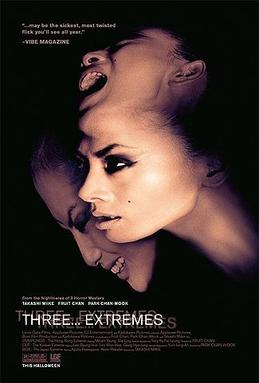
Three... Extremes is a 2004 anthology horror film consisting of three individual segments from three different East Asian countries—China, Japan, and South Korea—following the concept of its predecessor, Three (2002).

Gozu is a 2003 Japanese horror comedy crime film directed by Takashi Miike and written by Sakichi Sato. The film blends yakuza stories with ghost stories, bizarre vignettes, urban legends, and Japanese folk legends.

Masters of Horror is an anthology television series created by director Mick Garris for the Showtime cable network.

Andromedia (アンドロメディア) is a 1998 Japanese film directed by Takashi Miike. The film features the Japanese musical groups Speed and Da Pump.

"Jenifer" is the fourth episode of the first season of Masters of Horror. It originally aired in North America on November 18, 2005. It was directed by Dario Argento and written by and starring Steven Weber. "Jenifer" is loosely adapted from a 10-page black-and-white comic book story, written by Bruce Jones and illustrated by Berni Wrightson, that originally appeared in issue #63 of the horror anthology title Creepy.
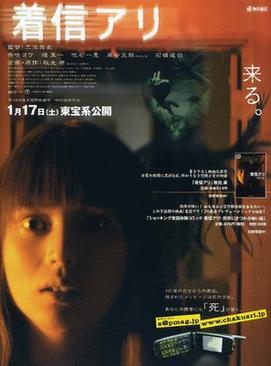
One Missed Call is a 2003 Japanese horror film directed by Takashi Miike. The film is based on the novel Chakushin Ari by Yasushi Akimoto. The plot revolves around Yumi Nakamura, a young psychology student whose friend Yoko gets a strange voice message on her cell phone. When Yumi receives a call with the date and time of her death, she struggles to save herself and learn the truth behind the calls.
Mai Takahashi is a Japanese actress and model.

Erin Brown is an American actress. She has starred in over fifty low-budget films as Misty Mundae.

"Valerie on the Stairs" is the eighth episode of the second season of Masters of Horror. The episode was directed by Mick Garris and is based on the Clive Barker story of the same name.

Tormented is a 2011 Japanese horror film directed by Takashi Shimizu. The film involves Kiriko and her younger half-brother Daigo who are haunted by a large rabbit-doll. Tormented premiered at the 68th Venice International Film Festival on September 7, 2011.

Ichi the Killer is a Japanese manga series written and illustrated by Hideo Yamamoto. A first series, titled Ichi, was serialized in Shogakukan's seinen manga magazine Weekly Young Sunday in 1993; Ichi the Killer was serialized in the same magazine from 1998 to 2001, with its chapters collected in ten tankōbon volumes. The series revolves around Ichi, a psychologically troubled killing machine, and his confrontation with the yakuza of Kabukichō, Shinjuku.

The Lion Standing in the Wind is a 2015 Japanese drama film directed by Takashi Miike. It was released on March 14, 2015. It is based on the true story of a Japanese doctor working in Africa using information from letters sent home to the girl he left behind in Japan. The letters originally formed the basis for the popular 1987 Japanese song "Kaze ni Tatsu Lion" by Masashi Sada, who was encouraged by actor Takao Osawa to adapt the song into a novel. The novel was released in 2013 and was later adapted into the 2015 film directed by Takashi Miike.
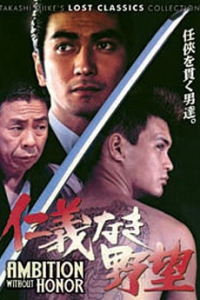
Ambition Without Honor is a 1996 Japanese direct-to-video yakuza film directed by Takashi Miike. The film's title has also been translated as Ruthless Ambition and Heartless Ambition. It was followed by Ambition Without Honor 2 in 1997.

Detective Story is a 2007 Japanese crime film directed by Takashi Miike.
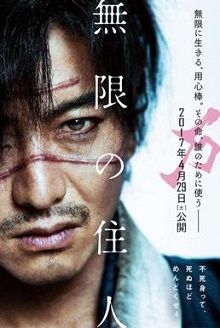
Blade of the Immortal is a 2017 samurai action film starring Takuya Kimura and Hana Sugisaki and directed by Takashi Miike. It is based on the successful manga series by Hiroaki Samura. The narrative focuses on the immortal samurai Manji (Kimura) who becomes the bodyguard of an orphan teenager named Rin Asano (Sugisaki) as they go on a journey of vengeance against the members of the Ittō-ryū samurais who killed the child's parents.
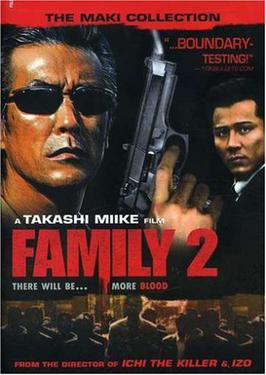
Family 2 is a 2001 Japanese yakuza film directed by Takashi Miike, released on home video as the sequel to his earlier film Family.
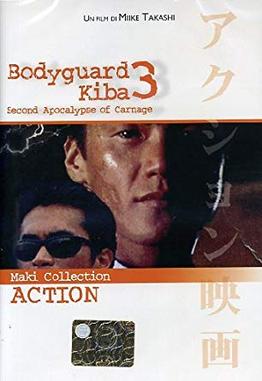
Bodyguard Kiba: Apocalypse of Carnage 2, also known as Bodyguard Kiba 3: Second Apocalypse of Carnage, Bodyguard Kiba: Combat Apocalypse 2, or simply Bodyguard Kiba 3, is a 1995 Japanese direct-to-video martial arts/action film directed by Takashi Miike. It is the final part of Miike's Bodyguard Kiba trilogy, following the 1993 film Bodyguard Kiba and the 1994 film Bodyguard Kiba: Apocalypse of Carnage.

Demon Pond is a filmed stage production of Demon Pond, a play by Keishi Nagatsuka based on the 1913 play by Izumi Kyōka. The production, directed by Takashi Miike, was filmed before a live audience and released on DVD in Japan on May 25, 2005.



















